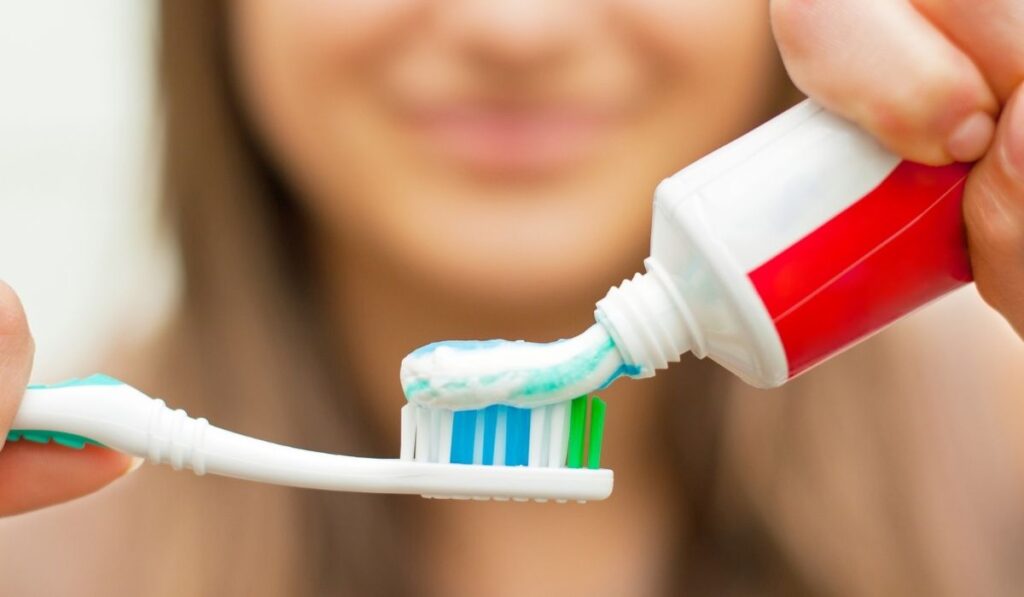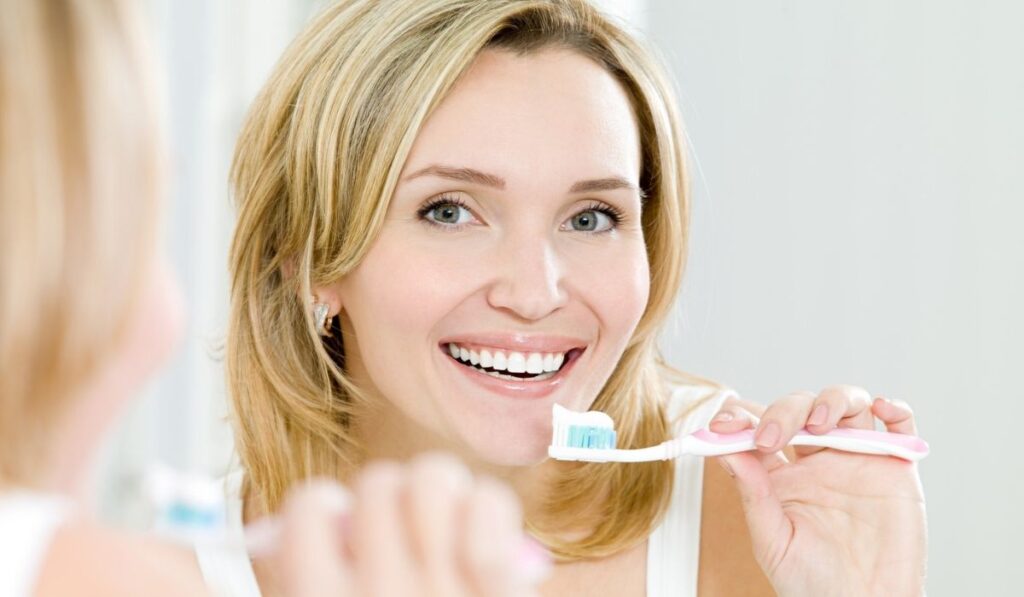Toothbrushes and toothpaste are two ever-present, inseparable objects in our bathroom cabinets. However, you should think twice before squeezing out that next glob of toothpaste onto your brush, because it might be doing much more than cleaning your teeth. Can toothpaste actually be bad for your teeth?
Some of the chemicals in toothpaste (like fluoride) are useful, but others (like abrasives) can damage enamel. Always use toothpaste with the ADA seal of approval, and ask your dentist for their recommended toothpastes. Try multiple brands until you find one you’ll look forward to using every day.
The truth is that brushing your teeth without toothpaste is just as effective as brushing with it (and even better in some cases). Let’s look at how each ingredient in toothpaste works, ADA’s recommendations on toothpaste, and some alternatives you might want to consider.
Is Toothpaste Bad For Your Teeth?

As we mentioned above, the answer to this question lies somewhere between yes and no (helpful, right?). It totally depends on the ingredients used in your toothpaste.
The main components of toothpaste are water, abrasives (mostly calcium carbonate), fluoride, detergents (sodium lauryl sulfate), flavoring agents, artificial color, sweeteners, humectants (sorbitol, glycerin), and preservatives (sodium benzoate, methylparaben).
Each ingredient has a purpose, and some are good, some not so much. However, it’s also very clear that dry brushing with regular tap water can completely fulfill basic dental hygiene needs. Here’s a list of common ingredients:
- Water: Makes it easier to spread the paste around and mix with the other ingredients.
- Heamactants: Help keep the paste moist for longer.
- Detergents: Make the foamy texture and whiten teeth.
- Fluoride: Promotes stronger enamel, decreases caries, inhibits plaque bacteria.
- Abrasives: Help clean and remove plaque from teeth.
- Flavoring: Makes toothpaste more palatable, breath freshener.
- Preservatives: Extends the shelf life of toothpaste.
Specific whitening toothpastes have other added ingredients (phosphates, hydrogen peroxide, carbamide peroxide) to remove stains from your teeth.
Two active ingredients, fluoride and abrasives, are regulated by ADA (American Dental Association). ADA measures the abrasiveness of a chemical in RDA (relative dental abrasion). The higher the RDA, the more harmful it is for enamel.
The ADA recommends a maximum RDA value of 250, and toothpaste above this value is considered too abrasive to your enamel.
Fluoride strengthens enamel, inhibits bacterial growth in saliva, and helps reduce tooth decay. But ADA recommends fluoride toothpaste only for children above two years and adults. The enamel is not fully mineralized in younger children, and fluoride may cause stains and streaks on teeth.
Children under age two also have a hard time spitting toothpaste out and tend to swallow it. Swallowing too much fluoridated toothpaste can lead to an upset stomach. Wait until your child can fully spit out and rinse their mouth before you let them brush their teeth with it.
If you want to avoid potential side effects of toothpaste, it’s highly advised to look for toothpaste with the ADA seal of approval. ADA-compliant brands use safe fluoride levels and abrasives, so you can be confident the toothpaste you buy is not harmful to your teeth.
Of course, you can always consult your dentist to get advice on the best toothpaste for your specific needs.
Can Toothpaste Damage Your Teeth?

Yes, it can. If your toothpaste has a lot of abrasives, it can permanently damage your enamel.
As the name suggests, abrasives are hard chemicals that wear away minerals like sandpaper remove paint. Calcium carbonate, aluminum oxide, pyrophosphate, and dehydrated silica are some of the most common abrasives used in commercial toothpaste.
They’re very effective at removing plaque to prevent dental diseases like gingivitis. But toothpastes with lots of them can penetrate your tooth enamel and scrape its protective layer away, which causes extreme sensitivity at first and then leads to dental erosion.
In addition, long-term usage of such toothpaste causes permanent teeth damage.
Fluoride in Toothpaste
The other harmful ingredient is fluoride. Although it’s deemed safe for adults, it can cause some side effects in small children. Fluoride leads to fluorosis, which causes streaky or stained teeth in children younger than two years old, and there is also a risk of swallowing.
If ingested in large quantities, fluoride is toxic. That’s why ADA recommends just a pea-sized amount of toothpaste for children. You can also give them fluoride-free toothpaste until they’re able to use it without swallowing. We recommend Orajel’s fluoride-free training toothpaste (on Amazon).
Hydrogen Peroxide and Artificial Flavors in Toothpaste
Other potentially harmful ingredients are hydrogen peroxide and artificial flavors. Hydrogen peroxide has a bleaching effect on teeth, but it causes excessive wear on the enamel surface if left on the teeth for too long.
As a result, you may end up with extremely sensitive, discolored teeth. Artificial sweeteners and flavors (pineapple, spearmint, cinnamon) may trigger allergies in susceptible individuals, and there is no telling whether you might be one of them.
In conclusion, though toothpaste has a list of benefits when used properly, it does have the potential to damage your teeth. The key to avoiding potential side effects is to look out for harmful chemicals in your toothpaste. When buying a tube, make sure you get one with an ADA seal on it.
You can also consult your dentist or hygienist for the best suggested toothpaste.
What Is The Best Toothpaste For Your Teeth?
Dental care brands offer a wide range of toothpaste targeted at different oral problems. They also come in different concentrations, so choose the one that best suits your needs. We have a few suggestions:
Best For Sensitivity: Sensodyne Pronamel (On Amazon)
Sensodyne Pronamel is one of the most prescribed toothpaste by dentists because of the bio-active potassium nitrate it contains. This unique formula prevents demineralization and coats the enamel surface to eliminate hypersensitivity towards hot and cold.
It also makes enamel more resistant to acids that cause cavities and gum inflammation—definitely one of the best toothpaste for sensitive teeth.
Best All-Around Toothpaste: Colgate Total Toothpaste
Colgate Total toothpaste will eliminate bacteria in your mouth for 12 whole hours after you brush. It has a great-tasting, minty flavor, and its zinc and fluoride content are perfect for protecting you from gingivitis and cavities.
This toothpaste will completely protect your mouth all day and leave you feeling clean and fresh, no matter what comes.
Can Toothpaste Repair Damage Teeth?
Technically, once your teeth lose enamel, it’s impossible to recover all of the minerals you lost. But with proper usage, some products can help remineralize to a certain extent.
For example, toothpastes with potassium nitrate like Sensodyne Pronamel can repair the damage to some extent. It remineralizes the remaining enamel and seals damaged areas, protecting them from further damage.
Dental erosion is caused due to acidic foods, drinks, etc. Early signs of erosion are increased sensitivity, increased staining on teeth, and a rough tooth surface.
If the problem is diagnosed and addressed in time, continuous usage of remineralizing toothpastes can stop the threat and reduce the risk of further damage. However, this process is slow, and it’ll take years of dedication and care to reverse the damage you’ve done already, so start early.


